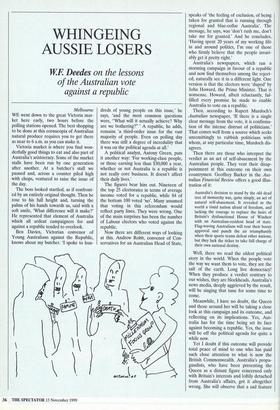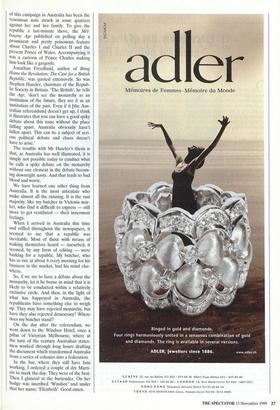WHINGEING AUSSIE LOSERS
W.F. Deedes on the lessons of the Australian vote against a republic
Melbourne WE went down to the great Victoria mar- ket here early, two hours before the polling stations opened. The best shopping to be done at this cornucopia of Australian natural produce requires you to get there as near to 6 a.m. as you can make it.
Victoria market is where you find won- derfully good things to eat and also part of Australia's aristocracy. Some of the market stalls have been run by one generation after another. At a butcher's stall we paused and, across a counter piled high with chops, ventured to raise the issue of the day.
The boss looked startled, as if confront- ed by an entirely original thought. Then he rose to his full height and, turning the palms of his hands towards us, said with a soft smile, 'What difference will it make?' He represented that element of Australia which all ardent campaigners for and against a republic tended to overlook.
Ben Davies, Victorian convenor of Young Australians against the Republic, knows about my butcher. 'I spoke to hun- dreds of young people on this issue,' he says, 'and the most common questions were, "What will it actually achieve? Why are we bothering?" ' A republic, he adds, remains 'a third-order issue for the vast majority of people. Even on polling day there was still a degree of incredulity that it was on the political agenda at all.'
A political analyst, Antony Green, puts it another way: 'For working-class people, or those earning less than $30,000 a year, whether or not Australia is a republic is not really core business. It doesn't affect their daily lives.'
The figures bear him out. Nineteen of the top 25 electorates in terms of average income voted for a republic, while 84 of the bottom 100 voted 'no'. Many assumed that voting in this referendum would reflect party lines. They were wrong. One of the main surprises has been the number of Labour electors who voted against the republic.
Now there are different ways of looking at this. Andrew Robb, convenor of Con- servatives for an Australian Head of State, speaks of 'the feeling of exclusion, of being taken for granted that is running through regional and blue-collar Australia'. The message, he says, was 'don't rush me, don't take me for granted.' And he concludes, 'Having spent 20 years of my working life in and around politics, I'm one of those who firmly believe that the people invari- ably get it pretty right.'
Australia's newspapers, which ran a storming campaign in favour of a republic
and now find themselves among the reject- ed, naturally see it in a different light. One version is that the electors were 'duped' by John Howard, the Prime Minister. That is nonsense. Howard, albeit reluctantly, ful- filled every promise he made to enable Australia to vote on a republic.
Then, according to Rupert Murdoch's Australian newspaper, 'If there is a single
clear message from the vote, it is confirma- tion of the intense distrust of politicians.' That comes well from a source which seeks unremittingly to rubbish politicians with whom, at any particular time, Murdoch dis- agrees.
Then there are those who interpret the verdict as an act of self-abasement by the
Australian people. They vent their disap- pointment at this outcome on their own countrymen. Geoffrey Barker in the Aus- tralian Financial Review offers a good illus- tration of it: Australia's decision to stand by the old dead tree of monarchy was, quite simply, an act of natural self-abasement. It revealed to the world a timid nation afraid of freedom, and lacking the courage to replace the heirs of Britain's dysfunctional House of Windsor with an Australian-resident head of state. Flag-waving Australians will roar their boozy approval and punch the air triumphantly when their sports teams defeat other nations, but they lack the ticker to take full charge of their own national destiny.
Well, there we read the oldest political story in the world. When the people vote the way we want them to vote, they are the salt of the earth. Long live democracy! When they produce a verdict contrary to our wishes, they are blockheads. Australia's news media, deeply aggrieved by the result, will be singing that tune for some time to come.
Meanwhile, I have no doubt, the Queen and those around her will be taking a close look at this campaign and its outcome, and reflecting on its implications. Yes, Aus- tralia has for the time being set its face against becoming a republic. Yes, the issue will be off the political agenda for quite a while now.
Yet I doubt if this outcome will provide total peace of mind to one who has paid such close attention to what is now the British Commonwealth. Australia's propa- gandists, who have been presenting the Queen as a distant figure concerned only with Britain's interests and loftily detached from Australia's affairs, got it altogether wrong. She will observe that a sad feature
of this campaign in Australia has been the venomous note struck in some quarters against her and her family. To give the republic a last-minute shove, the Mel- bourne Age published on polling day a prominent and pretty poisonous feature about Charles I and Charles II and the present Prince of Wales. Accompanying it was a cartoon of Prince Charles making him look like a gargoyle.
Jonathan Freedland, author of Bring Home the Revolution: The Case for a British Republic, was quoted extensively. So was Stephen Haseler, chairman of the Repub- lic Society in Britain. 'The British', he tells the Age, 'don't see the monarchy as an institution of the future, they see it as an institution of the past. Even if it [the Aus- tralian referendum] doesn't get up, I think it illustrates that you can have a good spiky debate about this issue without the place falling apart. Australia obviously hasn't fallen apart. This can be a subject of seri- ous political debate and chaos doesn't have to arise.'
The trouble with Mr Haseler's thesis is that, as Australia has well illustrated, it is simply not possible today to conduct what he calls a spiky debate on the monarchy without one element in the debate becom- ing downright nasty. And that leads to bad blood and worse.
We have learned one other thing from Australia. It is the most articulate who make almost all the running. It is the vast majority, like my butcher in Victoria mar- ket, who find it difficult to express — still more to get ventilated — their innermost feelings.
When I arrived in Australia this time and riffled throughout the newspapers, it seemed to me that a republic was inevitable. Most of those with means of making themselves heard — uncurbed, it seemed, by any form of editing — were barking for a republic. My butcher, who has to rise at about 4 every morning for his business in the market, had his mind else- where.
So, if we are to have a debate about the monarchy, let it be borne in mind that it is likely to be conducted within a relatively exclusive circle. And then, in the light of what has happened in Australia, the republicans have something else to weigh up. They may have rejected monarchy, but have they also rejected democracy? Where does my butcher stand?
On the day after the referendum, we went down to the Windsor Hotel, once a pillar of Victorian Melbourne, where at the turn of the century Australian states- men worked thrbugh long hours drafting the document which transformed Australia from a series of colonies into a federation.
In the bar, where they still have fans working, I ordered a couple of dry Marti- nis to mark the day. They were of the best. Then I glanced at the bartender. On her badge was inscribed 'Windsor' and under that her name, 'Elizabeth'. Good omen.



























































































 Previous page
Previous page